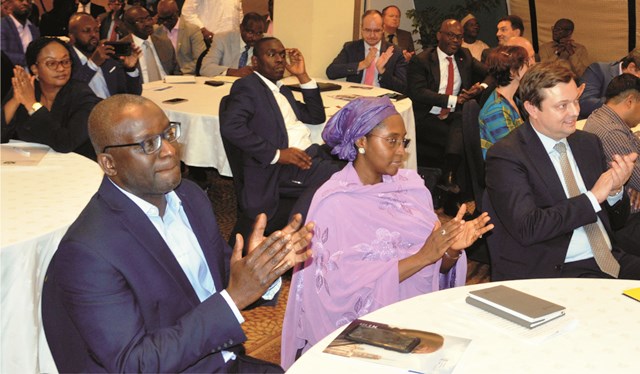Business
FG Licenses 158 New Seed Firms

To boost agricultural activities, the Federal Government has licenced 158 new seed companies to commence production of quality seeds.
The Director-General of the National Agricultural Seed Council (NASC), Dr Philip Ojo, disclosed this at a press conference in Abuja, Wednesday.
The Tide source reports that the new approvals were given in addition to the 156 already existing licences.
Ojo said that the Minister of Agriculture and Rural Development, Chief Audu Ogbeh, gave the approval in order to address the problem of inaccessibility and lack of quality seedling.
He said that the approvals were made up of 16 new small-scale companies, 133 producer and seller entrepreneurs and nine seed dealers.
According to him, the approval also became necessary in order to allow more players in the seed industry to produce and distribute quality seeds to farmers.
He added that out of the 158 new seed entrepreneurs, 10 were foreign companies while the rest 148 were Nigerian outfits.
Ojo admitted that though a deficit in seed availability still exists, this would be bridged to a large extent with the new approvals.
“The Governing Board of NASC under the chairmanship of the Honourable Minister of Agriculture and Rural Development, Chief Audu Ogbeh, has ratified and approved the licensing of 158 new seed entrepreneurs of different categories to add to the existing 156 already operating.
“I want to assure you that this is borne out of the determination to allow many qualified entrepreneurs to explore the bidding liberalised landscape of the seed industry.
“I wish to allay your fears that most of these newly licenced companies are greenhorns in the business, but are mostly out-growers with long years of experience.
“They have acquired necessary facilities in relevant categories they have been classified into after due assessment by NASC.
“We all know that presently, the seed supply-demand gap is still wide and there are more calls from our neighbouring countries that look up to us for their seed supply,’’ he said.
According to him, Nigeria now has 314 seed entrepreneurs, 223 produce sellers and 20 seed dealers.
He clarified that NASC was not interested in the number of seed entrepreneurs but the quality of seeds being supplied to farmers.
Business
Agency Gives Insight Into Its Inspection, Monitoring Operations

Business
BVN Enrolments Rise 6% To 67.8m In 2025 — NIBSS

The Nigeria Inter-Bank Settlement System (NIBSS) has said that Bank Verification Number (BVN) enrolments rose by 6.8 per cent year-on-year to 67.8 million as at December 2025, up from 63.5 million recorded in the corresponding period of 2024.
In a statement published on its website, NIBSS attributed the growth to stronger policy enforcement by the Central Bank of Nigeria (CBN) and the expansion of diaspora enrolment initiatives.
NIBSS noted that the expansion reinforces the BVN system’s central role in Nigeria’s financial inclusion drive and digital identity framework.
Another major driver, the statement said, was the rollout of the Non-Resident Bank Verification Number (NRBVN) initiative, which allows Nigerians in the diaspora to obtain a BVN remotely without physical presence in the country.
A five-year analysis by NIBSS showed consistent growth in BVN enrolments, rising from 51.9 million in 2021 to 56.0 million in 2022, 60.1 million in 2023, 63.5 million in 2024 and 67.8 million by December 2025. The steady increase reflects stronger compliance with biometric identity requirements and improved coverage of the national banking identity system.
However, NIBSS noted that BVN enrolments still lag the total number of active bank accounts, which exceeded 320 million as of March 2025.
The gap, it explained, is largely due to multiple bank accounts linked to single BVNs, as well as customers yet to complete enrolment, despite the progress recorded.
Business
AFAN Unveils Plans To Boost Food Production In 2026
-

 News2 days ago
News2 days ago2026 Budget: FG Allocates N12.78bn For Census, NPC Vehicles
-

 Featured5 days ago
Featured5 days agoRSG Kicks Off Armed Forces Remembrance Day ‘Morrow …Restates Commitment Towards Veterans’ Welfare
-

 Featured5 days ago
Featured5 days agoTinubu Hails NGX N100trn Milestones, Urges Nigerians To Invest Locally
-

 Sports2 days ago
Sports2 days agoAFCON: Osimhen, Lookman Threaten Algeria’s Record
-

 Politics2 days ago
Politics2 days agoWike’s LGAs Tour Violates Electoral Laws — Sara-Igbe
-

 Politics2 days ago
Politics2 days agoRivers Political Crisis: PANDEF Urges Restraint, Mutual Forbearance
-

 Maritime2 days ago
Maritime2 days agoMARITIME JOURNALISTS TO HONOUR EX-NIWA MD,OYEBAMIJI OVER MEDIA SUPPORT
-

 Sports2 days ago
Sports2 days agoPalace ready To Sell Guehi For Right Price

